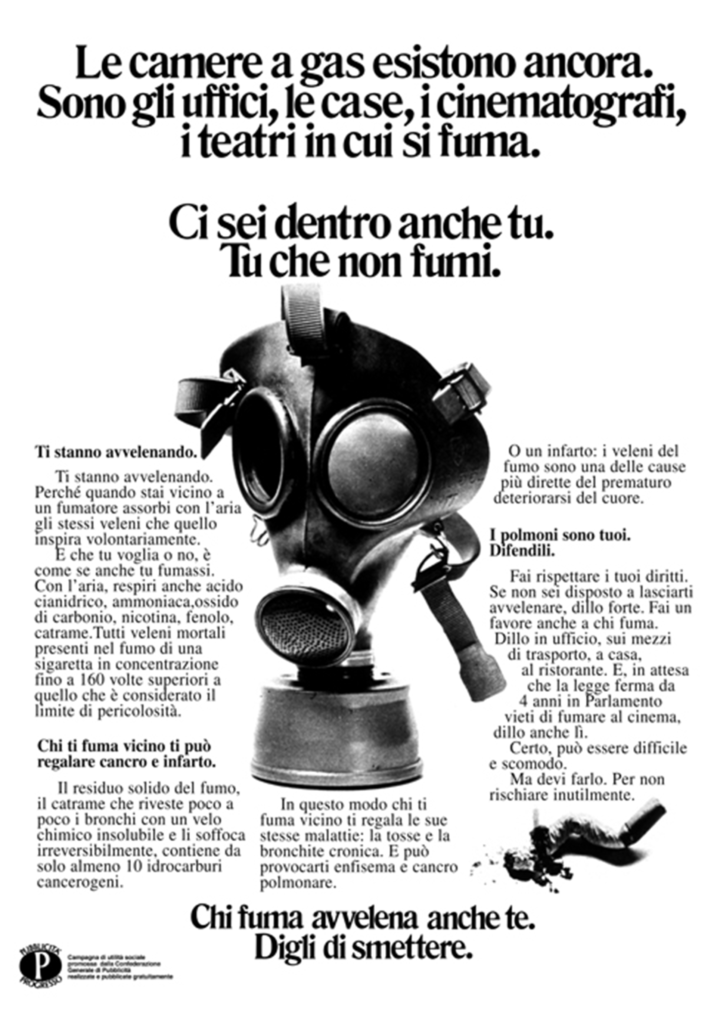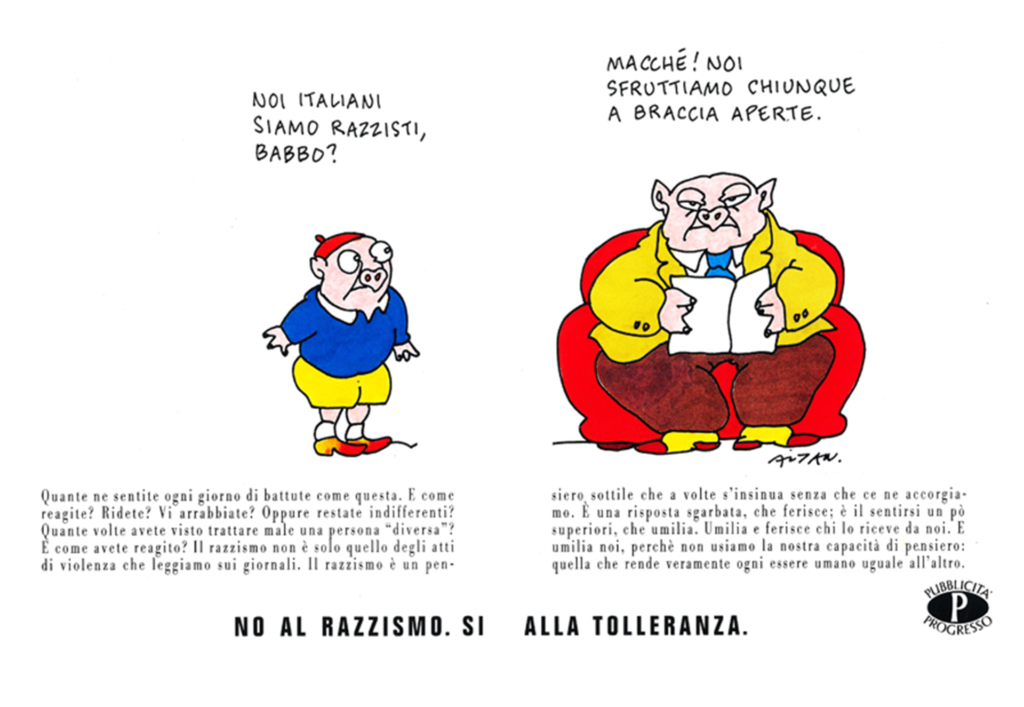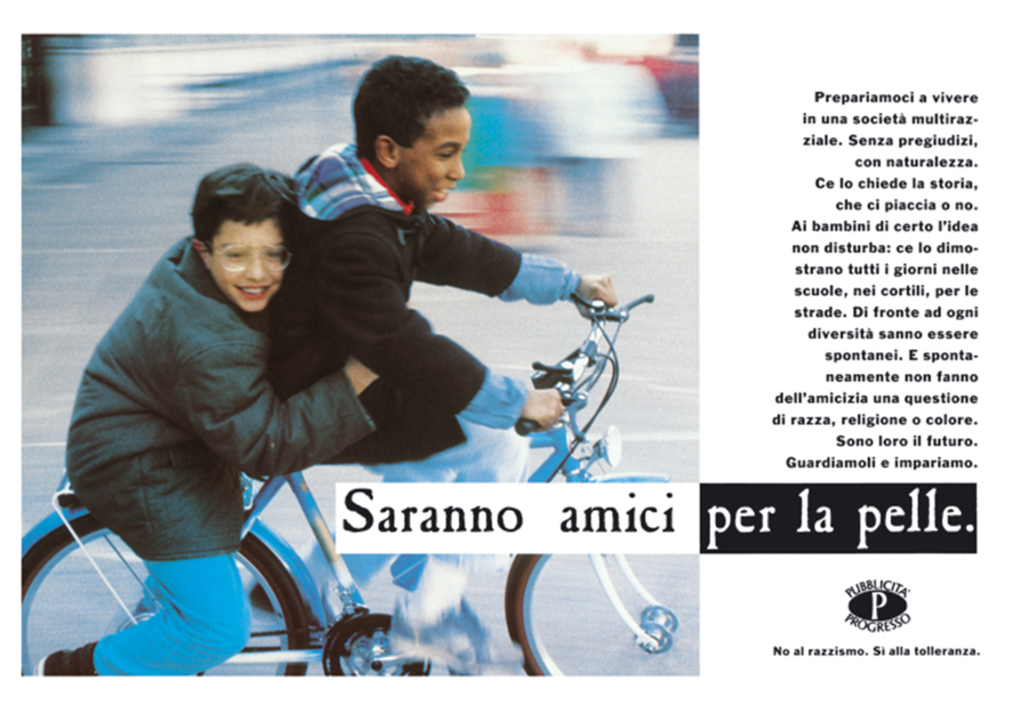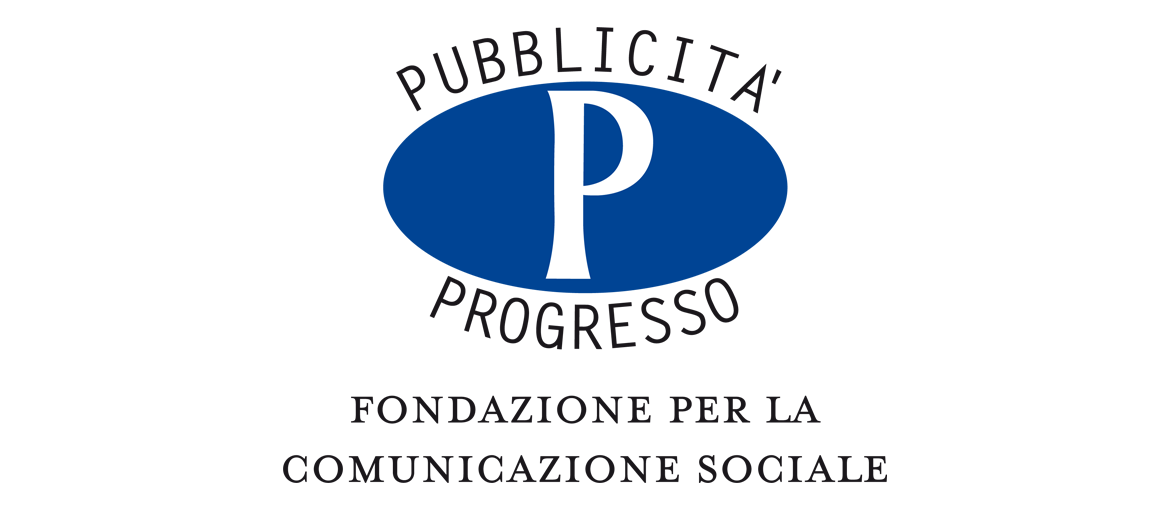Table of Contents
Pubblicità Progresso: the birth of public service announcements in Italy
Launched in 1971 and managed first as an association and then as a foundation, in its over 40 years Pubblicità Progresso has come up with a huge number of public service advertisement campaigns, and supported the development of social marketing in various ways, including exhibitions, books, e-books and training events for local groups, non-profit organisations, schools and universities.
Pubblicità Progresso was founded by the UPA (Utenti pubblicità associati – Associated Advertising Users), the industry body for advertisers, which realised that a mature and ethically aware society was fundamental if it was to achieve its profit targets. A non-profit organisation was therefore created to disseminate free advertising campaigns that aimed to overcome prejudices and make Italians conscious of the most important moral and civil issues of the day.
The association immediately hired the best creative agencies to promote its messages through various media channels: TV, radio, posters and (in later years) online. For over four decades, Pubblicità Progresso’s campaigns have accompanied Italy’s history and social and cultural development, highlighting the most pressing social and ethical issues it faced at the time.
Using advertising to benefit society
From the very first campaign, which aimed to increase the number of blood donors in Italy, the initiatives promoted by the association covered the widest range of social issues imaginable: protecting the environment and cultural heritage, battling smoking, protecting the most vulnerable in society, and much more.
Sometimes Pubblicità Progresso has focused on topics linked to education, such as the ‘Per un automiglioramento‘ (‘Improve Yourself’) campaign in 1995, which sought to improve Italians’ education and personal and professional development, or the 1999 campaign to encourage people to improve their computer literacy and study English. Research had shown that Italians were among the worst in Europe when it came to using a computer and speaking a second language.
For the first time, the creative professionals working with the association were not being asked to sell a product, but instead to raise Italians’ level of awareness, inviting them to reflect on topics and act appropriately. Using simple but effective images and slogans, advertising language was deployed with an important objective – to sway public opinion on the most important issues for the country’s social and civil development and to encourage positive action.
Raising awareness of disability
The ‘E allora?‘ (‘So What?’) campaign from 2003 undoubtedly shaped Italian history. A song composed by Lucio Dalla, adverts on TV and radio and in newspapers and posters described disability from a new, prejudice-free viewpoint.
Featuring the smiling faces of people with disabilities from the charity Cooperativa Solidarietà, the images and text displayed the full extent of their courageous and dignified attitude to life and their pursuit of happiness.
As part of the campaign, Pubblicità Progresso also asked students on the creative writing course at Centro Lab in Rome to help out. The result was 20 short stories describing the birthday of someone with a disability, all set in different countries.
The stories were published on a specially designed website (unfortunately no longer available) and the public was invited to read them and leave comments on a discussion forum – an example of a cross-media social communication strategy using storytelling as a more engaging and inclusive way to talk about diversity and integration.
The campaign against passive smoking
The topics Pubblicità Progresso chooses to cover are always on the back of extensive social research: in 1975, data extrapolated from studies into nicotine dependence in Italy led the association to concentrate not so much on smokers, but rather on the victims of passive smoking.

The result was an anti-smoking campaign that helped to ensure the law banning smoking on public transport and in certain public places was passed, after years of paralysis in parliament. The slogan ‘Chi fuma avvelena anche te. Digli di smettere’ (‘Smokers are poisoning you too. Tell them to stop’) entered the national conversation, and in the years that followed the poster produced for the campaign was requested by organisations and individuals throughout Italy.
The campaign against racism
Another important campaign, unfortunately still very relevant today, was ‘No al razzismo‘ (‘No to Racism’), which was launched in 1990. To begin with, the advertising agency hired for the project chose to tackle the delicate topic of racial prejudice with the dramatic and powerful image of a crucified black man.
Then cartoons by Chiappori and Altan displaying cutting irony were used, alongside texts discussing equality for all.

The following year, the message was softened still further, with images of children and words evoking a multiracial society.

In this case it is interesting to note how the advertisers of the era chose to steadily reduce the emotive impact of the message: initially shocking the public with an image bordering on blasphemy, then provoking them with the bitter irony of the cartoons, then finally ‘pacifying’ them through a more positive message that envisaged a future where different races could live in harmony. A controversial choice, perhaps, but it shows the various ‘weapons’ in social advertising’s armoury.
Pubblicità Progresso’s work has helped to develop Italians’ social and moral awareness, and remains essential for the country’s civil and cultural development. You can browse an archive of all the campaigns on the foundation’s website.

